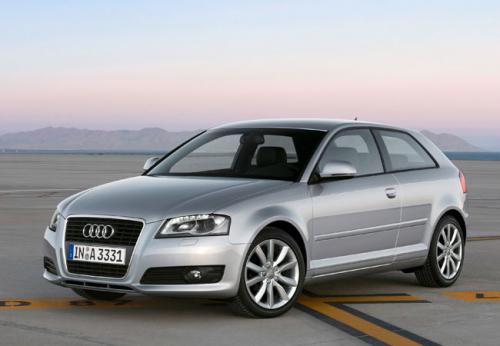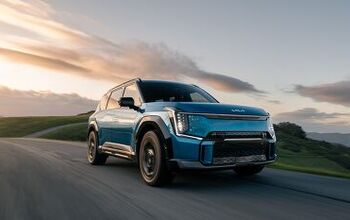Editorial: Off With Their Heads: Luxury Car Brands Under Siege
On Thursday, Audi of America president, Johan de Nysschen, will meet with journalists to explore the question “how has the international recession impacted Audi and the luxury segment?” The obvious answer: sinking sales. The not-so-obvious conundrum: what next? How does a luxury brand position itself for survival when class war is breaking out all over? Of course, the professional pundocrats aren’t using “C” word just yet. The euphemism du jour for the “where’s MY bailout” anger that may or may not be sweeping the nation—as taxpayer-owned AIG execs collect their bonuses and Bernie Madoff’s wife shelters in a penthouse funded by her husband’s ill-gotten gains—is “vengeful populism.” Whatever you call it, Audi and its luxury competitors are sitting in the cross-hairs of growing anti-conspicuous consumption. The recession/depression is going to kick the NSFW out of them.
Audi, BMW, Cadillac, Lexus and Mercedes have all poorly positioned themselves for these belt-tightening times. All five brands spent the last decade or more stretching their model range down into near-luxury and even non-luxury pricing territory. Not so long ago, none of these brands were available to average buyers (save on used car lots, where maintenance costs kept them clean of ten-foot pole marks). All five luxury brands couldn’t resist picking the low-hanging fruit, convincing themselves that they could democratize an exclusive brand.
Of course it worked. What aspirational car buyer wouldn’t prefer an up-market marque to a Ford, Hyundai, Toyota, Nissan, etc.? Thanks to a combination of affordable models and cheap credit, the “Big Five” have all experienced sales growth that makes Jack’s beanstalk seem like a redwood. BMW’s inexpensive leasing deals, in particular, created ultimate profits. But the move down market has created a vast flock of prodigal, homeward-seeking chickens.
For one thing, profits at Audi, BMW, Cadillac, Lexus and Mercedes are now dependent on relatively high sales volumes. In 2007, Mercedes-Benz NA sold 253,433 vehicles. Audi’s US sales jumped 11 percent, to 93,506 vehicles. Cadillac’s sales rose 13 percent. BMW’s ascended by 14 percent. Lexus took a hit that year, but they still managed to shift 342,000 units in North America. Compared to the mainstream manufacturers it’s small beer; but it still requires many pubs to serve it. All five luxury brands expanded their dealer networks. Which are now, or soon will be, struggling for survival. Last month, Lexus sales took a 35.8 percent year-on-year dip. Audi lost 25.4 percent of its previous year’s monthly totals. And so on, right on down the line.
Brand equity has also taken a huge hit. Although you might think the luxury car brands’ democratization makes them less vulnerable to a class-related backlash, nope. Let’s face it: it’s not a great time to be seen “splurging” on a luxury car. The car brands’ upmarket cachet has suddenly turned into a liability. Real world employees worried about their paychecks—and that’s all of them—are not going to stunt and floss in the company parking lot behind the wheel of a brand new Audi, BMW, Cadillac, Lexus or Mercedes. They know that rolling phat in a luxury-branded whip would be tantamount to wearing a little button emblazoned “overpaid.” Fuhgeddaboutit.
Even worse, the customers with real money, where profits fall like rain, have already left the building. They’ve opted for more genuinely exclusive marques. Audi and Mercedes recognized this problem before the axe fell; buying (Lamborghini), creating (AMG, S-Line) or resurrecting (Maybach, Bugatti) über-luxury off-shoots. But even if Audi and Mercedes managed to skim the cream off their own coffee, they face the same danger as their less brand-savvy luxury competitors: stagnation. Now that upmarket brands offer a wide range of models, cash-strapped or cash-aversive buyers can either stand pat (i.e., not trade-up) or, worse, opt for less expensive alternatives within the brand family.
So why would Mercedes create the GLK, when it already offers a full-size SUV AND a smaller alternative? Why would Mercedes market the GLK as a vehicle containing the same technological excellence as its bigger brothers, only in a smaller (read: cheaper) package? The Bama-built German “cute ute” represents a failure to communicate luxury brand values—and price points—within Mercedes’ corporate culture. It’s the same hubris that led to the Audi A3, BMW 1-Series, Cadillac CTS (sorry guys), Lexus IS250 and Mercedes C-Class. Short term greed over careful, long-term brand husbandry.
I know TTAC’s Best and Brightest have hashed this out many times. Many of you don’t see a price point as a brand barrier. But it’s petard hoisting time folks, and you’re about to see the brands reap what I said they’d sowed. In this suddenly, violently downsized, flash-aversive sales environment, brand-extended luxury automotive marques must either redefine “luxury” (as reliability, longevity, etc.), move back up-market (a slow, painful process) or die. And the longer the downturn lasts, the greater the chances that one or more of these brands will never recover.
More by Robert Farago
Latest Car Reviews
Read moreLatest Product Reviews
Read moreRecent Comments
- Sayahh I do not know how my car will respond to the trolley problem, but I will be held liable whatever it chooses to do or not do. When technology has reached Star Trek's Data's level of intelligence, I will trust it, so long as it has a moral/ethic/empathy chip/subroutine; I would not trust his brother Lore driving/controlling my car. Until then, I will drive it myself until I no longer can, at which time I will call a friend, a cab or a ride-share service.
- Daniel J Cx-5 lol. It's why we have one. I love hybrids but the engine in the RAV4 is just loud and obnoxious when it fires up.
- Oberkanone CX-5 diesel.
- Oberkanone Autonomous cars are afraid of us.
- Theflyersfan I always thought this gen XC90 could be compared to Mercedes' first-gen M-class. Everyone in every suburban family in every moderate-upper-class neighborhood got one and they were both a dumpster fire of quality. It's looking like Volvo finally worked out the quality issues, but that was a bad launch. And now I shall sound like every car site commenter over the last 25 years and say that Volvo all but killed their excellent line of wagons and replaced them with unreliable, overweight wagons on stilts just so some "I'll be famous on TikTok someday" mom won't be seen in a wagon or minivan dropping the rug rats off at school.


































Comments
Join the conversation
Guys, illuminate (illuminati?) me: what does this have to do with luxury cars?
I think it'll end up postulating that "the Jews" will soon be the only ones with money to buy cars, which disagrees with the premise in the article that the inexpensive models are a mistake. I kid.